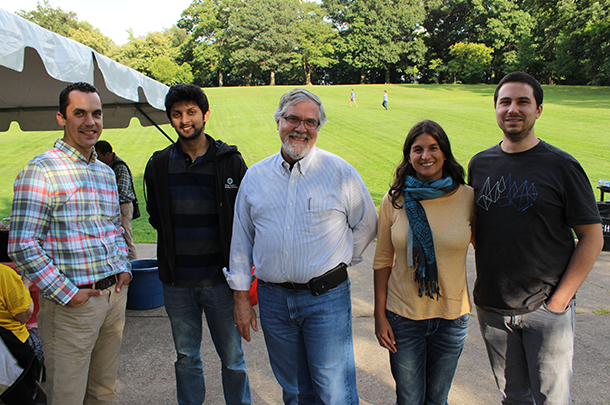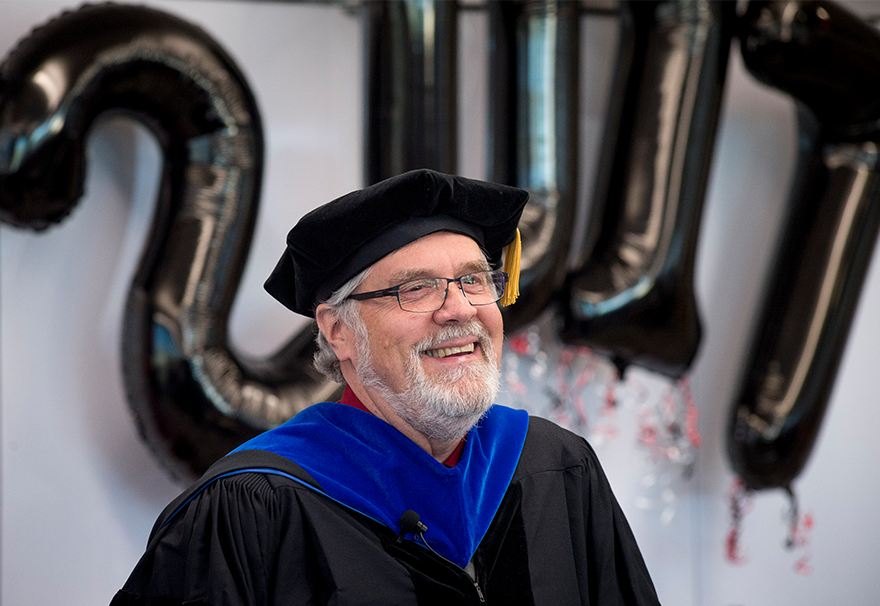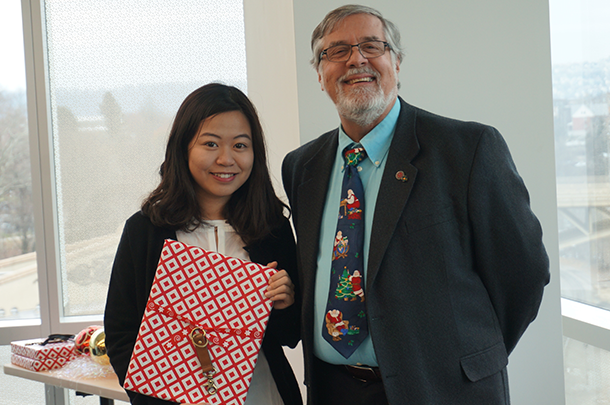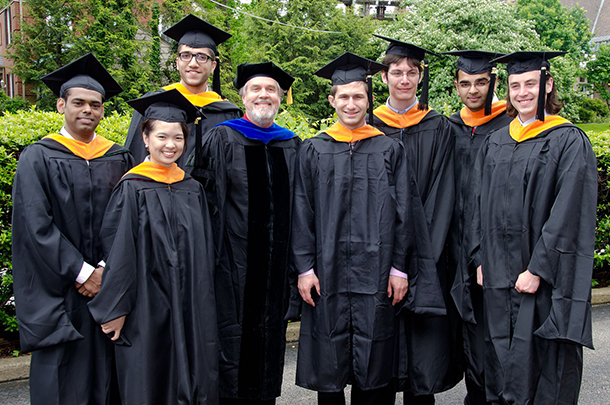Motorcycles, makers, master’s programs
Dave Landis reflects on his time at CMU in his year before retirement.
“I refer to myself as a gear head,” Dave Landis said about his passion for cars and motorcycles.
Automobiles are a mirror for how deeply engineering intertwines with his life. In his younger days, he would take apart mechanisms and electronics to understand them and appreciate their designs. Often in high school, he would fix up neglected cars. Then upon graduating from college, he bought his first motorcycle and travelled cross-country. This savvy for tinkering and technology led him toward study in electrical engineering as an undergraduate at Carnegie Mellon University.
Landis recalls that his undergraduate studies were hands-on and pragmatic, thinking fondly of the normalcy of iterating projects in the lab and building and testing them. This nurtured a culture of making and makers. Over the years, however, the mood waxed and waned, Landis says. He holds a unique perspective on this culture at CMU, having participated in it years ago and then having returned to it 40 years later in its modern form.
Once, while Landis listened to a talk given by former University President Jared Cohon in Roberts Engineering Hall, the power failed. Cohon mused on how, 30 years earlier, a dozen students would immediately jump up to run to the power system to identify and repair the failure.

Source: Dave Landis
“For a while, we engineers just sat behind the computers and ran simulations,” says Landis. “But now we’re getting out from behind the screens to emphasize building again.” The maker environment has returned, he believes, the same as it once was.
Landis’ passions in education and engineering shaped his career path, with switchbacks from private to public sectors. Upon attaining his BS in electrical engineering from CMU, he began a career at RCA, then at Honeywell. He studied for and received an MS in Systems Engineering from The University of Pennsylvania. Later, he received a Ph.D. in Electrical Engineering from The Pennsylvania State University (Penn State). He went on to teach at the University of South Florida in Tampa, and at Penn State.
While teaching at Penn State, an opportunity arose that would later draw Landis back to Pittsburgh. He learned of an organization called the Pittsburgh Digital Greenhouse. The group sought to improve Pennsylvania’s technological economy by incubating companies and bringing them into closer connection. When Landis submitted a proposal for a new product development that went unfunded, he stumbled upon and applied for an opening for the job of Vice President of Education.
The VP would act as a liaison between the Greenhouse and regional universities. Landis deeply appreciated this connectivity.
“As a college professor, it’s difficult that students leave after you teach them,” he says. “Some come back to visit, but mostly there’s no continuing connection as they move forward in productive engineering careers.” To Landis, he could engage with the educational mission of a university while working with engineers and companies to foster economic development.

Source: Dave Landis
He landed the job and began to work on educational programs connecting companies with Penn State, University of Pittsburgh, and CMU.
Landis describes the Greenhouse wonderfully. He fondly remembers the challenging and fun work. He felt actualized, and it was adventurous to contribute to the building up of companies from nothing. But the Greenhouse itself was a startup, with a business plan to operate for only eight to ten years to facilitate regional development. Its mission was to then “get out of the way” as companies continue to grow. As the Greenhouse wound down, Landis contemplated his next career move.
“What area did I want to work in?” he asked himself. Turning this question over, he was interested in entering the field of energy pursued by some of the Greenhouse companies. But then there was the question of place. “Did I want to go with a company? Or non-profit? Or back to the university?” Ultimately, he chose the third option.
He connected with CMU engineering faculty just starting a Master of Science program in Energy Science, Technology & Policy (EST&P). But the program had a problem: with the first students admitted and arriving in a few months, there was no program director and advisor. So, Landis stepped in.
He characterizes the program’s early phases as the staff and students huddling together for warmth. But, the growing pains were essential. The first group of students helped mold a template for the following years.

Source: Dave Landis
“Luck favors prepared minds,” Landis said about building the MS program and advising its first students.
To better conjure luck, he and the staff defined ways for students to gain wide and deep understandings of the field. Interdisciplinary work is essential to this, Landis believes. The specific engineering or scientific background of a student matters less than whether a prospective student has a passion for energy. The students “use each other’s strengths to overcome individual weaknesses by doing the type of team-project work they’re likely to do in a job in energy,” Landis says.
Elaborating on interdisciplinary collaboration, Landis mused on the many facets to solving problems in energy. He mentioned how one topic in energy begets another. Energy poverty and supply are interrelated with fuel sources and pollution. Landis has helped to structure the MS program in a way that students learn about energy solutions that holistically consider resources, technology, and policy.
For his years as the EST&P executive director, Landis’ style is to guide students the same way he would guide a member of a startup. He encourages a student to “be agile and willing to pivot and change their mind, but always have a goal and a vision for the future.” Landis has always tried to nurture a holistic view of education and to help students stay in line with their professional goals.

Source: Dave Landis
To model this for themselves, Landis commented on how much the students changed the program, pushing for faculty connections, making a collaborative lounge space and participating in energy events and career fairs. Landis always desires for students to positively shape the world. To him, “there’s nothing wrong with idealism.”
After more than seven industrious years with EST&P, Landis is ready to retire in the Spring of 2018. To him, it’s time now to bring in a new director for whom energy is their first love. He said that, as for the where of retirement, “Pittsburgh is my town: just the right size, and there’s always interesting stuff going on.” Among his hobbies to carry him through retirement, Landis currently attends most to playing acoustic guitar with friends and to spending time on his motorcycles.
His passion for riding started upon graduating from CMU. Back then, he thought, “I’ve been a student for so long—I need to see more of the US.” He bought a used motorcycle and set out on a cross-country trip, stopping to see friends along the way and ending up in California. His plan upon retirement is to repeat this trip while visiting friends, family, and former students.
Landis says he’s treating this “epic motorcycle journey” as part of the sabbatical he never had.
